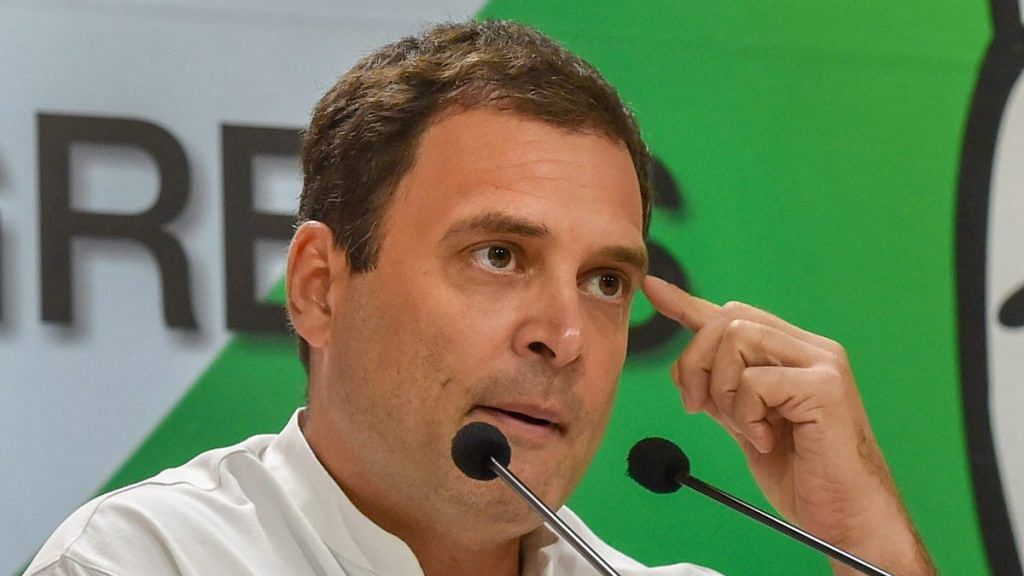Congress’ defeat in Jind bypoll and its inability to stitch an alliance with AAP raise questions about its strategy for 2019 elections.
One way to stop Narendra Modi from coming back to power, or so goes the Lutyens’ Delhi logic, is to ensure that the BJP gets less than 220 seats and the NDA is stopped short of the 250-MP mark.
While one has to wonder where these two numbers come from – why 220, why not 219? – almost everyone you talk to in Lutyens’ Delhi these days is sure Modi isn’t coming back as PM. The same set of people have also already decided that in case the party gets less than 220 MPs, either Nitin Gadkari or Rajnath Singh will be the next Prime Minister.
If you lived in or socialised with the Lutyens’ Delhi crowd, you may be forgiven for thinking the last vote for 2019 general elections has been cast and counted, and we are already in a post-Modi era.
This is precisely what a strong section of the Congress is also buying. “Rahul ji’s ‘chowkidar chor hai’ war-cry is resonating with people across the country” and “Modi is certainly on his way out” are two claims that one hears often from the Congress leaders and the anti-Modi brigade.
Also read: Forget 2029, the Sangh Parivar is not even sure of 2019
But what about the Congress? Is the party even hoping to cross the 100-seat mark? The Congress seems to believe that it is the logical alternative in case people don’t want to vote BJP.
If this was correct, then why did the Congress end up a poor third in the Jind bypoll while the BJP won a seat that it had never won earlier, even though the state government under Manohar Lal Khattar is perceived to be inefficient and, according to the opposition, hugely unpopular? The fact that it couldn’t win despite the recent split in the Indian National Lok Dal (INLD) and fielding Rahul Gandhi’s favourite and a man many see as a future chief minister of the state, Randeep Surjewala, should have sent the party scurrying to find answers about what went wrong with its strategy.
What is the Congress plan?
But does the Congress even have a strategy? Does it have answers to a scenario in case the BJP is stranded at below 200 seats and the NDA doesn’t cross 240 seats? Is it even trying to ensure that it wins the seats that the BJP loses in some states, especially in the three that it recently wrested back from the BJP – Rajasthan, Madhya Pradesh and Chhattisgarh?
The Congress believes it is only logical that those seats will fall in its lap. This is where its planners seem to have got it all mixed-up.
Wouldn’t it have been a smart thing for the Congress to take to the streets, especially in rural areas, against the “measly” Rs 500 per month dole to each farmer with land holdings of less than two hectares announced in the interim budget Friday? But, Team Rahul doesn’t seem to have figured this out yet.
Where is the grand old party gaining seats from? Bihar? Rajasthan? Madhya Pradesh? Haryana? Punjab? Uttar Pradesh? Gujarat? The Northeast? West Bengal? Maharashtra?
Barring Punjab, Rajasthan, Gujarat, Chhattisgarh and Madhya Pradesh, there may not be too many gains for the party on its own.
The smart strategy would have been to zero in on the 200-odd winnable seats, complete its selection process for those seats by now, and direct the candidates to begin a soft campaign. This would also have given the party time to soothe ruffled features and frayed tempers of rebels.
Also read: Thomas Piketty & Angus Deaton help frame Rahul Gandhi’s minimum income promise
The AAP conundrum
A few days back, senior Aam Aadmi Party (AAP) leader Gopal Rai announced that the party will “not enter into any alliance” with the Congress and instead contest on all seats in Delhi, Punjab and Haryana on its own.
But, it was what he said before this statement that was more interesting. He accused the Congress of being arrogant, indicating that the AAP’s repeated attempts to close a pre-poll alliance with the Congress had not been finalised due to the latter’s attitude.
Put together, Delhi, Punjab and Haryana account for 30 Lok Sabha seats. The Congress’ own local leadership talks of a best-case scenario of winning 14 – eight in Punjab, five in Haryana and one seat in Delhi. With the AAP, even if the Congress were to win just one extra, helping AAP win five or seven, wouldn’t that have made better sense?
But Rahul Gandhi and his close advisers, most of whom seem to float around in the Lutyens’ circle, seem to be under the mistaken notion that the anti-BJP vote will automatically get transferred to the Congress.
The Gandhis also have much to lose
What they don’t seem to understand is that Narendra Modi and BJP chief Amit Shah have as much to lose as Rahul Gandhi and his family if they don’t retain power. To retain power and continue as PM, Modi will go to any limit, cross any Lakshman Rekha, and take full advantage by dividing opposition votes.
When Modi said after the interim budget that this was just the “trailer” and much more would follow, it wasn’t a statement – it was a message to the voters.
Many in the Congress seemed to have understood this. But does Rahul?
The answer to that question could be the biggest key to whether we see Modi or someone else as the PM by the end of May.
Also read: It’s time to remonetise the Indian economy with Rahul Gandhi’s minimum income guarantee
